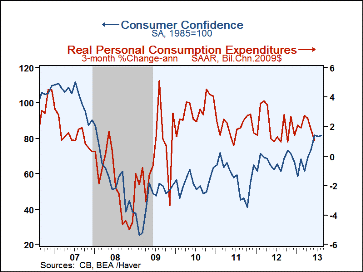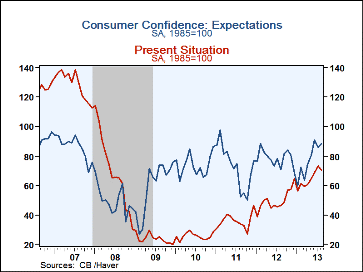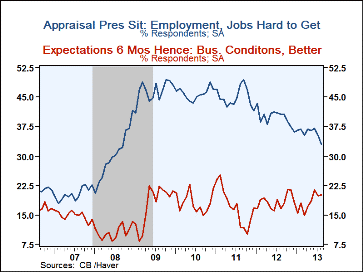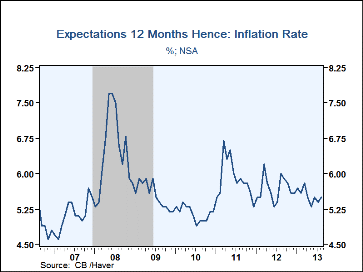 Global| Aug 27 2013
Global| Aug 27 2013U.S. Consumer Confidence Ticks Up M/M
by:Tom Moeller
|in:Economy in Brief
Summary
The Conference Board's Consumer Confidence Index ticked up to 81.5 this month from an upwardly revised 81.0 during July, last month reported as 80.3. The level of the confidence index peaked at 82.1 in June. Consensus expectations [...]
The Conference Board's Consumer Confidence Index ticked up to 81.5 this month from an upwardly revised 81.0 during July, last month reported as 80.3. The level of the confidence index peaked at 82.1 in June. Consensus expectations were for a slip to 79.0. During the last ten years, there has been a 47% correlation between the level of confidence and the three-month change in real PCE.
Holding back the overall level of confidence was a decline in consumers' assessment of the present economic situation. This index fell to 70.7 from its cycle-high of 73.6. A lessened 18.4% of respondents viewed business conditions as good. Also, an increased 55.6% believed that jobs were not plentiful. That's somewhat surprising since just 33.0% thought that jobs were hard to get, the least since October 2008.
The expectations component of confidence rose to 88.7 and made up a piece of its July decline. It remained down, however, from the June peak of 91.1. Expectations for business conditions held steady month-to-month, but remained greatly improved versus the January low. The sense of employment prospects improved slightly yet remained below the June high. Expectations for the inflation rate in twelve months were roughly steady m/m at 5.5%, down from the 6.7% high in 2011. Expectations for higher interest rates in twelve months slipped to 67.9% of respondents. That followed last month's surge to the highest level since July 2006. The percentage expecting higher stock prices recovered moderately after last month's sharp decline.
The consumer confidence index for those under 35 years backpedaled from its July high. Confidence amongst middle-aged individuals reached a new cycle high, while confidence amongst individuals over 55 years fell backward following two months of increase.
The Consumer Confidence data is available in Haver's CBDB database.
| Conference Board (SA, 1985=100) | Aug | Jul | Jun | Y/Y % | 2012 | 2011 | 2010 |
|---|---|---|---|---|---|---|---|
| Consumer Confidence Index | 81.5 | 81.0 | 82.1 | 33.0 | 67.1 | 58.1 | 54.5 |
| Present Situation | 70.7 | 73.6 | 68.7 | 52.0 | 49.8 | 36.1 | 25.7 |
| Expectations | 88.7 | 86.0 | 91.1 | 24.8 | 78.6 | 72.8 | 73.7 |
| Consumer Confidence By Age Group | |||||||
| Under 35 Years | 101.5 | 106.0 | 101.1 | 29.8 | 86.5 | 77.3 | 70.4 |
| Aged 35-54 Years | 88.4 | 80.5 | 84.6 | 32.5 | 68.5 | 59.8 | 55.1 |
| Over 55 Years | 66.7 | 68.2 | 70.5 | 40.7 | 56.6 | 47.3 | 47.4 |
Tom Moeller
AuthorMore in Author Profile »Prior to joining Haver Analytics in 2000, Mr. Moeller worked as the Economist at Chancellor Capital Management from 1985 to 1999. There, he developed comprehensive economic forecasts and interpreted economic data for equity and fixed income portfolio managers. Also at Chancellor, Mr. Moeller worked as an equity analyst and was responsible for researching and rating companies in the economically sensitive automobile and housing industries for investment in Chancellor’s equity portfolio. Prior to joining Chancellor, Mr. Moeller was an Economist at Citibank from 1979 to 1984. He also analyzed pricing behavior in the metals industry for the Council on Wage and Price Stability in Washington, D.C. In 1999, Mr. Moeller received the award for most accurate forecast from the Forecasters' Club of New York. From 1990 to 1992 he was President of the New York Association for Business Economists. Mr. Moeller earned an M.B.A. in Finance from Fordham University, where he graduated in 1987. He holds a Bachelor of Arts in Economics from George Washington University.
More Economy in Brief
 Global| Feb 05 2026
Global| Feb 05 2026Charts of the Week: Balanced Policy, Resilient Data and AI Narratives
by:Andrew Cates










